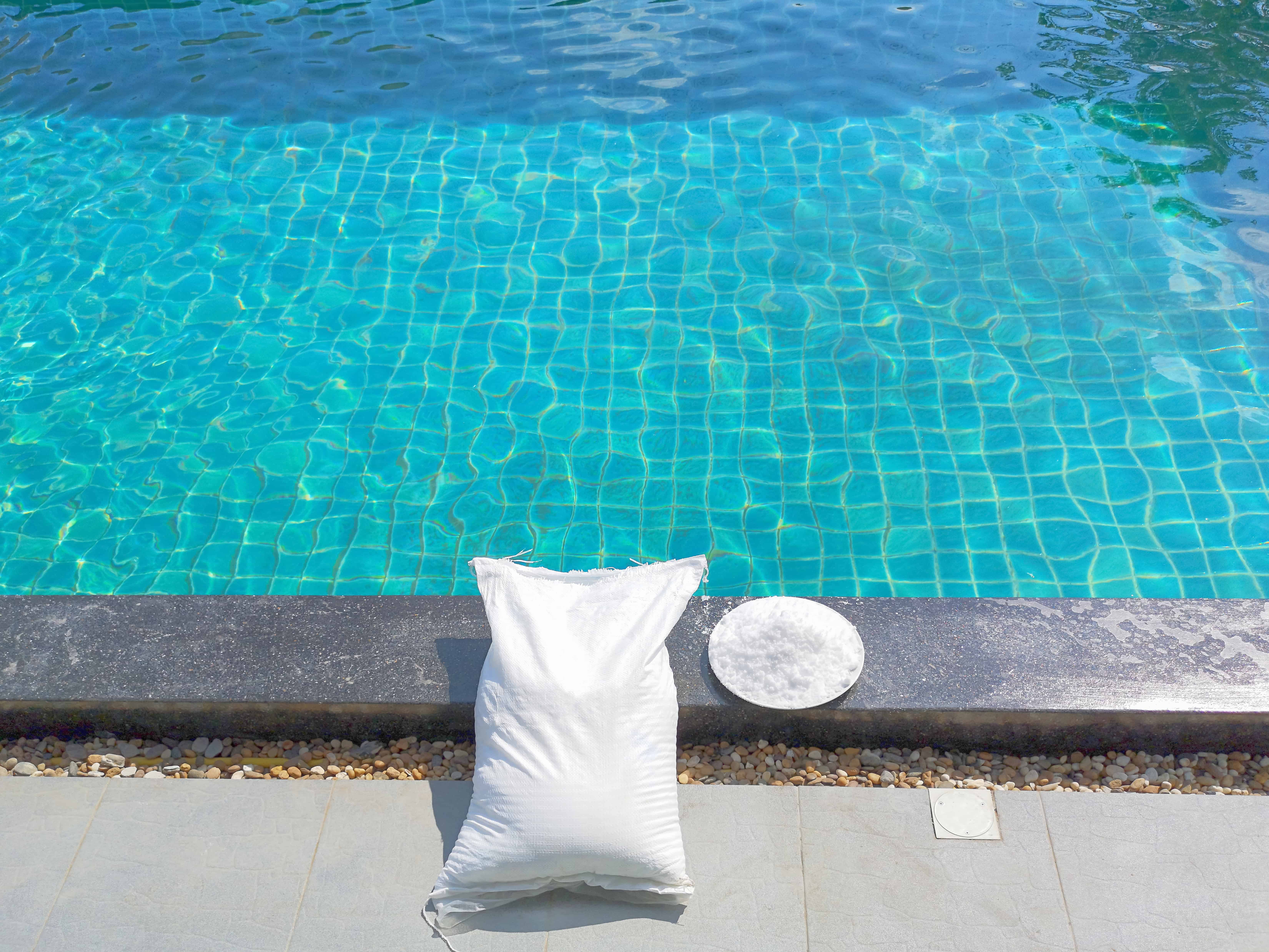Salt (sodium) gets added to a pool that has a salt chlorinator system for the system to produce chlorine to sanitize the water. But you have to add salt repeatedly – often twice per pool season – so the question is what happens to the salt in a salt water pool if it keeps disappearing?
Salt doesn’t evaporate but it is lost through water leaks and large scale water drainage such as back washing a filter or lowering the water level during winterization by pumping water out.
Dissolved salt gets turned into chlorine and can be used repeatedly during the process but when large amounts of water are removed from the pool, salt will be lost that needs to be replaced.
How salt is used by the salt chlorinator
You add salt to your pool and it dissolves in the water over a period of time. If you dump a regular sized bag of pellet salt into the water with the pump running, the entire bag should be completely dissolved within a day or even less.
The salt then gets distributed throughout the water and makes its way into the pump and through the salt cell. When the chlorinator is running, an electrical charge is applied and the salt water is converted to chlorine. When the chlorine is used up, the salt gets converted back into chlorine and the process repeats. The process is repeated over and over again so that chlorine is continuously created.
This is how the salt is utilized by the salt chlorinator system. But while the salt can be used repeatedly to produce chlorine, salt does get lost over time that does need to be replaced. Below, we’ll discuss why this occurs.
A salt water pool loses salt in several ways
A salt water pool will lose salt over time from various ways and each involves the loss of water, too. This include splashing, leaks, draining water to lower the water level, back washing a filter and from swimmers walking in and out of pools and bringing water with them.
Granted, some of these reasons are significant and one of them is probably relatively minor (the last one) but they can add up. When you lose water, you’re going to lose salt too. This doesn’t include evaporation however. More on that below.
Click here to read my detailed article on why salt is lost in your pool.
Salt does not evaporate from a salt water pool
You’ll notice in the section above that evaporation is *not* on the list of reasons that salt disappears from the pool. Despite what you may have read:
- Salt does not evaporate.
- Salt does not wear out.
Salt can be repeatedly used by your chlorinator to produce chlorine but for the reasons above, the salt content in your water gets reduced over time due to water loss excluding evaporation. Because of this, salt needs to be added to the water typically at pool opening time and again halfway through the pool season.
You’ll have to add salt more frequently if you drain water from your pool in the autumn to close the pool or if you back wash your sand or D.E. filter. In each case, the water loss will cause you to lose salt too.
Salt however should not plummet or drop overnight very quickly, short of draining or losing a large amount of water.
Reasons that your pool may not be holding salt
Other than the above mentioned reasons for losing salt – splashing, leaks, draining water, back washing a filter and from swimmers – the only other reason you might experience a low salt reading is a malfunction in your method of salt testing, whether from the chlorinator’s instant salt reading or other method.
It’s possible that you don’t actually have a low salt reading but you’re being told that you do because of a malfunction in your testing method. This is why it’s always good to use your chlorinator’s instant salt reading and another method such as salt test strips (used weekly) as a secondary back up method.
Heavy rain dilutes chemicals but not salt content
A large rainfall dilutes the chemicals in the water particularly chlorine. But your salt content won’t dilute due to gaining water, only by losing water.
Again, salt doesn’t evaporate either so perhaps in a “perfect” storm you have a secondary problem(s) such as a leak or have to back wash or drain water several times due to heavy rain which will dilute salt to the point of having to replace it.
Keep an eye on water chemistry at all times but especially after heavy rainfalls and more so when you have to drain water to lower the level. Not only will you lose chemicals and potentially throw their levels out of whack, you will undoubtedly lose salt too.
How long salt lasts in a salt water pool
Salt doesn’t wear out or expire. It does need to be replaced due to water loss since salt also gets lost when water in your pool is removed in large amounts such as through leaks or deliberate drainage.
Evaporation only affects water not salt content, but splashing and other regular pool activities such as back washing (if you have a sand or D.E. filter) will cause salt loss too.
If you drain large amounts of water from your pool during the season, expect to top up salt at least once and probably more. If you drop the water level during pool winterization, you will also have to add salt to replenish the content that is lost.
Speaking of draining pool water, where should you do it? Does draining salt water from your pool kill your lawn?
Click here to find out!

